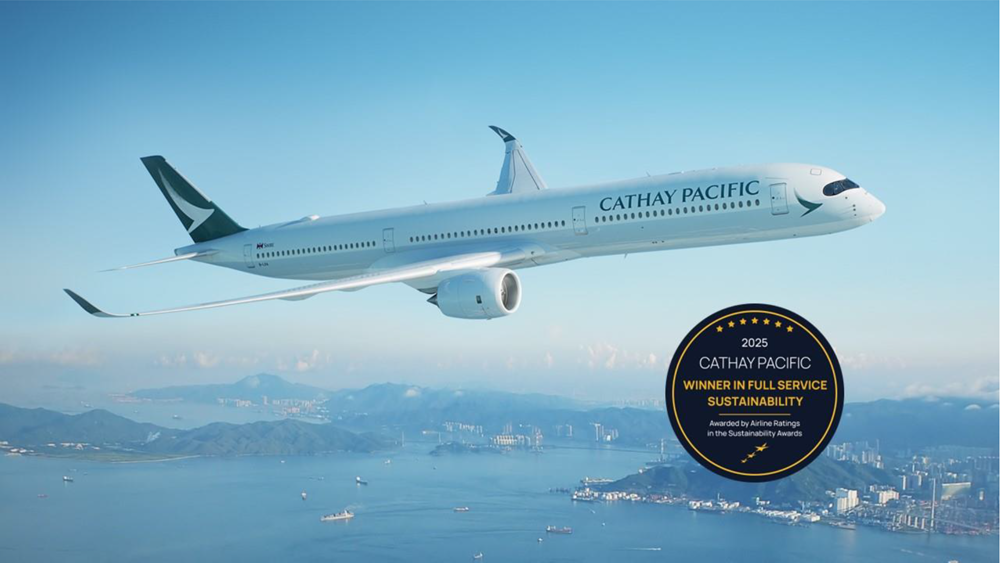Copyright © 2024 Swire Pacific Limited. All rights reserved.
Cookies and Privacy: We use cookies to enhance your user experience on our website. Please indicate your cookie preference. For more information, please read our Cookie Policy and Privacy Notice.
Continuing its efforts to address environmental impacts by strengthening its climate action and circular initiatives
Cathay has been recognised in the 2025 Sustainability Awards by Airline Ratings, being named a winner in the “Full Service Carriers” category for its broad range of sustainability initiatives across its inflight and cargo operations.

Reflecting its purpose to move people forward in life, Cathay is working towards achieving net-zero carbon emissions in its operations by 2050 and transitioning towards more circular use of resources and circular solutions.
Cathay General Manager Sustainability Grace Cheung said: “Sustainability is essential to the future of aviation. The issues are complex and can only be achieved by moving forward thoughtfully through collaboration with customers, business partners, suppliers, regulators, communities and our people.
“Only with our collective efforts can we go further together. We are honoured to be recognised for our endeavours as we continue to chart a path forward with sustainability leadership at the forefront.”
Cathay’s sustainability strategy focuses on addressing climate change impact through fleet modernisation, increased fuel efficiency and sustainable aviation fuel (SAF) use, and new technology; and addressing cabin waste by promoting a more circular use of resources and recycling initiatives.
Circular economy and waste management
Cathay continues to make progress in adopting more circular solutions for resource use. In particular, Cathay Pacific has committed to reducing its reliance on single-use plastics (SUP), with a pledge to cut the use of passenger-facing SUP items from 7.7 pieces per passenger in 2019 to 1.5 pieces by the end of 2025. As of the end of 2024, Cathay Pacific’s SUP usage had been reduced to 2.6 pieces per passenger.
Inflight, Cathay has introduced enhanced approaches to boost recycling of water bottles, with over 1.4 million plastic bottles by weight recycled since these enhanced measures were introduced in 2024. Meanwhile, all water bottles on outbound flights from Hong Kong are made with 100% recycled plastics (rPET) to enhance the circularity of plastic use in Cathay’s operations. To further reduce plastics waste, the airline has been exploring alternative materials, such as recycled paper for wrapping headphones and blankets instead of plastics. Trials also are being conducted to explore implementing more reusable serviceware in the Economy class cabin to minimise single-use items inflight.
Climate action and alternative fuels
SAF is widely considered by the industry as the most important lever for decarbonising aviation. Cathay launched its Corporate SAF Programme in 2022 to help accelerate the transition to SAF, enabling corporate partners to address their indirect emissions associated with air travel and airfreight services. In recent years, Cathay has successfully conducted uplifts of SAF onto its flights at both Hong Kong and other airports worldwide.
This year, Cathay has announced three new offtake or partnership agreements. This includes partnering with Sinopec to refuel some of Cathay Pacific’s flights departing from Hong Kong International Airport with blended SAF, with SK Energy for some flights departing South Korea, and with DHL Express to uplift blended SAF onto some flights operated by its express all-cargo carrier Air Hong Kong at Seoul Incheon, Tokyo Narita and Singapore Changi airports.
In addition, Cathay has joined hands with partners from across the value chain to promote the development of a supportive SAF policy at its Hong Kong hub.
On the ground in its cargo operations, Cathay Cargo Terminal is piloting the use of Hydrotreated Vegetable Oil (HVO) for its non-electric cargo tractors. It was also the first cargo terminal in Hong Kong to adopt 50% recycled plastic cargo cover sheets for all export cargo shipments built up within the terminal, and it currently recycles 100% of plastic sheets from import cargo shipments.
For more information on Cathay’s sustainability initiatives, visit: www.cathaypacific.com/cx/en_HK/about-us/sustainability/sustainability-reports.html